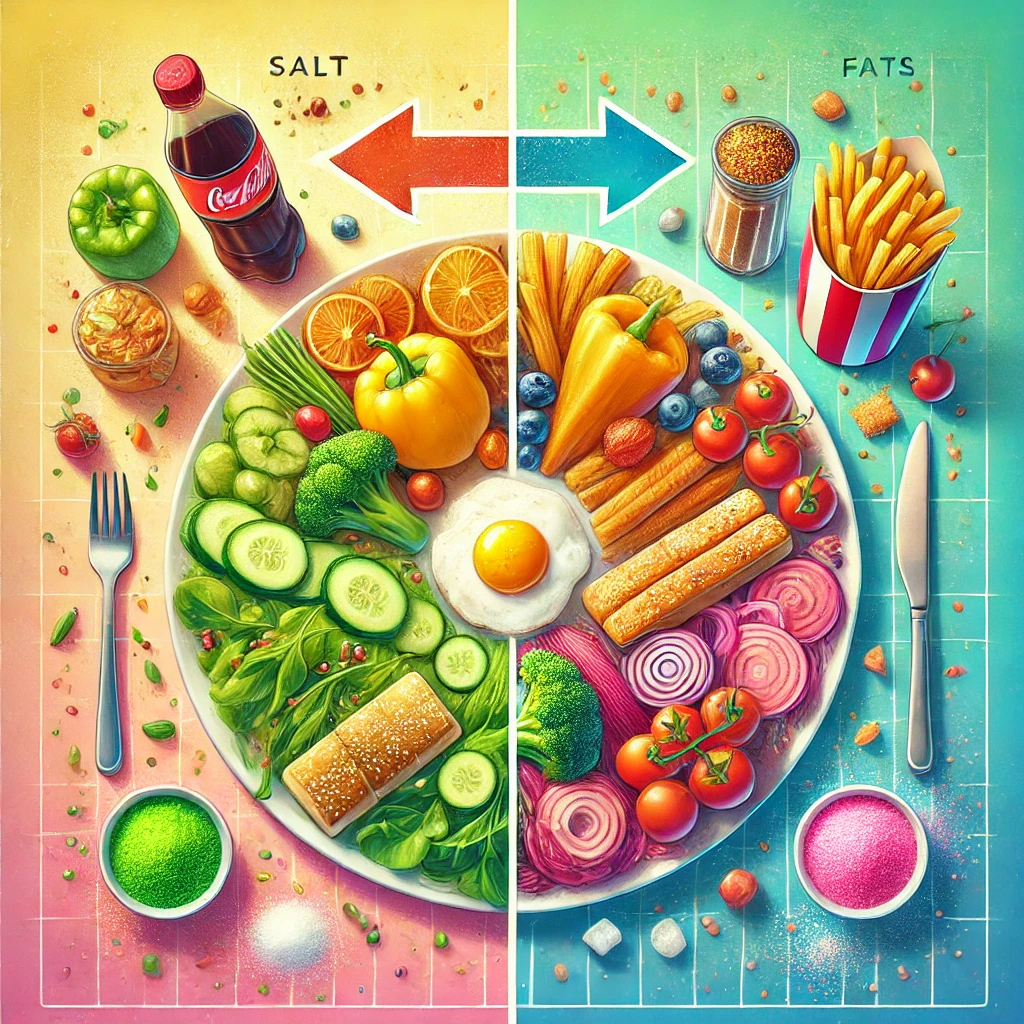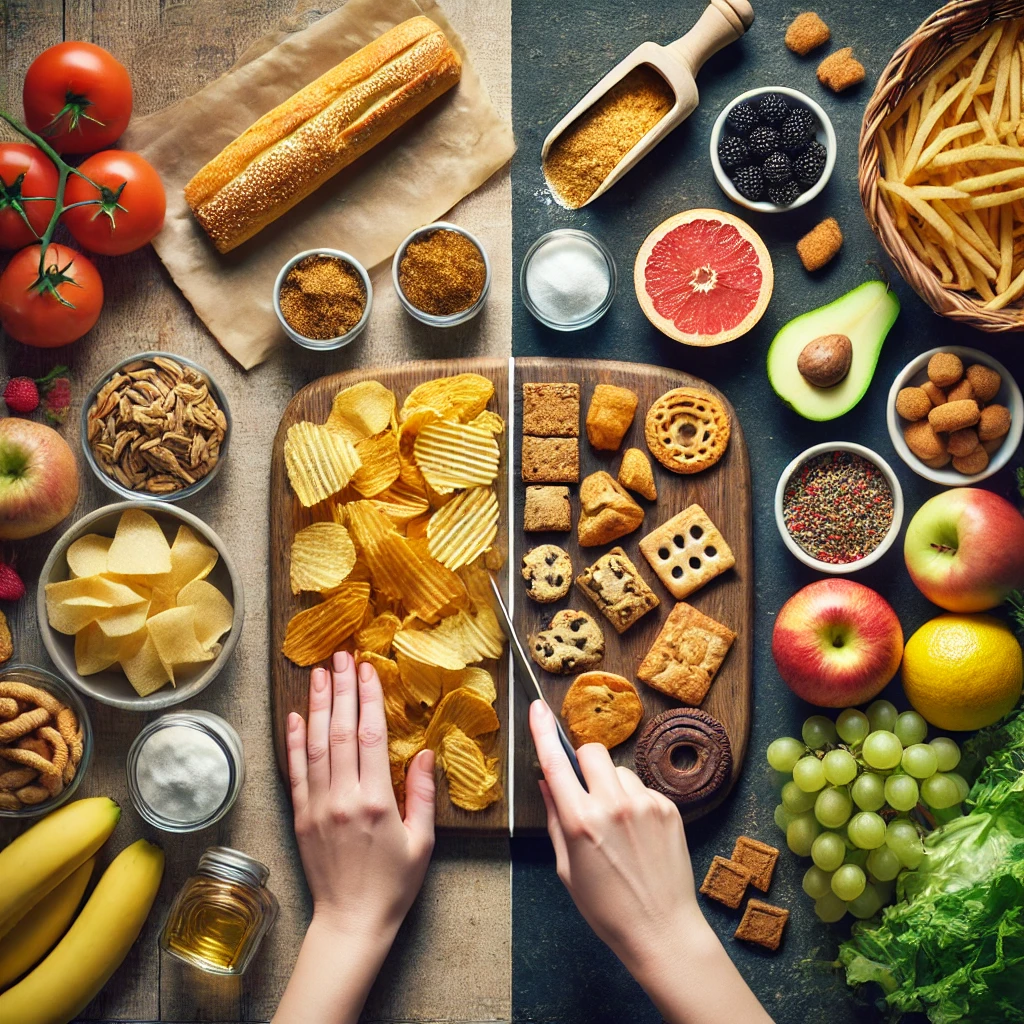Table of Contents
Understanding the Impact of Salt, Sugar, and Unhealthy Fats
The consumption of excessive salt, sugar, and unhealthy fats can have significant repercussions on overall health. High sodium intake is closely associated with hypertension, a condition that can lead to cardiovascular diseases. When there is an excess of salt in the diet, the body retains more water, increasing blood pressure and straining the heart. Over time, this heightened pressure can result in serious complications, including heart attacks and strokes. It is essential to monitor sodium levels to minimize these health risks and promote heart health.
In addition to salt, sugar plays a critical role in our diet, often in unhealthy forms. High sugar consumption is linked to obesity, as it contributes to an excessive caloric intake without providing essential nutrients. Furthermore, too much sugar can lead to insulin resistance, ultimately increasing the risk of developing Type 2 diabetes. This relationship between sugar and weight gain can create a cycle that is difficult to break, emphasizing the need for conscious dietary choices regarding sweeteners.
Moreover, unhealthy fats, particularly trans fats and high levels of saturated fats, pose additional health risks. Trans fats, often found in processed foods, can raise low-density lipoprotein (LDL) cholesterol levels while simultaneously lowering high-density lipoprotein (HDL) cholesterol. This dual effect is harmful as it may lead to the accumulation of plaque in the arteries, heightening cardiovascular disease risks. Saturated fats, found in animal products and some plant oils, should also be limited as they can influence cholesterol levels negatively.

Overall, understanding the detrimental effects of salt, sugar, and unhealthy fats is crucial for making informed dietary choices. By recognizing how these components affect health, individuals can take proactive measures to reduce their intake, leading to improved well-being. This foundational awareness sets the stage for implementing practical tips to achieve a balanced diet.
Practical Strategies to Reduce Salt Intake
Reducing salt in your diet is essential for maintaining overall health, especially considering the risks associated with high sodium consumption, such as hypertension and heart disease. Fortunately, there are several practical strategies you can employ to lower your salt intake while still enjoying flavorful meals.
One of the most effective methods to cut back on sodium is to use herbs and spices as alternatives to salt. Fresh basil, rosemary, thyme, cumin, and paprika can enhance the flavor of your dishes without the added sodium. Experimenting with various combinations can also lead to exciting new recipes to share with family and friends.
Reading nutrition labels is another critical strategy. Many processed and packaged foods contain excessive amounts of salt, often exceeding daily recommended limits. By choosing products labeled as “low sodium” or “no added salt,” you can make informed decisions and decrease your overall intake.
Choosing fresh or frozen produce over canned options is recommended. Canned vegetables, while convenient, often contain added sodium for preservation. Fresh vegetables or those that are frozen without additives are better alternatives that contribute essential nutrients without unnecessary salt. Preparing meals at home also allows for better control over the ingredients used. Cooking from scratch means you can select whole foods and limit the salt content based on your preferences.
It may be beneficial to gradually reduce salt in your cooking. When following a favorite recipe, try cutting the salt amount by half or substituting it with other flavor enhancers. Over time, your palate will adjust to the reduced sodium levels. Adopting these strategies can help you lower your sodium consumption significantly while still enjoying delicious meals.
Cutting Down on Sugar: Tips for a Healthier Lifestyle
Reducing sugar intake is essential for improving overall health and can be achieved through a variety of practical strategies. One of the first steps is to become adept at identifying hidden sugars in processed foods. Many products, even those labeled as “fat-free” or “healthy,” can contain substantial amounts of added sugars. Checking ingredient lists is crucial, as sugars can appear under various names, such as sucrose, fructose, and corn syrup. Understanding these terms helps consumers make informed choices.
Another effective method for cutting down on sugar is to opt for fresh fruits and unsweetened snacks as alternatives. Whole fruits provide natural sweetness, fiber, and essential vitamins, making them a nutritious choice over refined sugary snacks. For instance, opting for apple slices or berries can satisfy cravings without the added sugars found in candies and pastries. Additionally, incorporating unsweetened yogurt or nut butters can enhance snacks without compromising health.
When it comes to sweetening dishes, there are several natural options available that do not involve added sugars. Spices such as cinnamon, vanilla extract, or cocoa can impart a pleasant sweetness to recipes without relying on sugar. These alternatives can be utilized in various dishes, from oatmeal to baked goods, while also enhancing flavor profiles without excessive sweetness.
Moreover, adapting recipes to lessen sweetness can significantly contribute to reducing sugar intake. Utilizing less sugar than indicated in recipes is often adequate, especially in desserts, where the appeal of other flavors can shine through. As one’s palate adjusts, the need for added sweetness typically diminishes, allowing for enjoyment of flavors in their more natural state. This gradual process supports healthier eating habits and promotes long-term health benefits.
Finding Healthy Fats: Substitutions and Cooking Tips
Maintaining a diet low in unhealthy fats is essential for promoting overall health. One of the effective strategies is to replace trans fats and saturated fats with healthier fat options. A beneficial substitution is olive oil, which is rich in monounsaturated fats and has been associated with numerous health benefits, including a reduced risk of heart disease. Using olive oilfor cooking or as a dressing can elevate the nutritional profile of meals significantly. Another excellent alternative is avocado, which not only serves as a healthy fat source but also provides fiber and various vitamins. Incorporating avocados into salads, spreads, or smoothies can enhance flavor while supporting a balanced diet.
Nuts and seeds are also prudent choices for healthy fats. Nuts, such as almonds and walnuts, contain beneficial omega-3 fatty acids, which are known for their anti-inflammatory properties and heart health benefits. A handful of nuts can serve as a nutritious snack or can be added to various dishes. Furthermore, substantial science backs the idea that a diet incorporating these healthy fats can lead to improved cholesterol levels and overall health.
When it comes to cooking techniques, certain methods can help maximize the benefits of healthy fats. Grilling, roasting, and steaming foods can minimize the need for excess oils while still achieving delicious results. Utilizing non-stick cookware further reduces the amount of fat required during cooking, allowing the natural flavors of foods, especially vegetables, to shine through. Additionally, meal planning plays an essential role in emphasizing healthy fat choices. Preparing meals in advance ensures that healthy fats, such as olive oil and avocados, are readily available, helping to avoid the temptation of reaching for unhealthy options.
Incorporating these healthy fat sources into your diet can lead to positive changes in overall well-being while maintaining a delicious culinary experience. By making simple substitutions and applying effective cooking techniques, one can enjoy the numerous health benefits that come from a diet rich in healthy fats.






